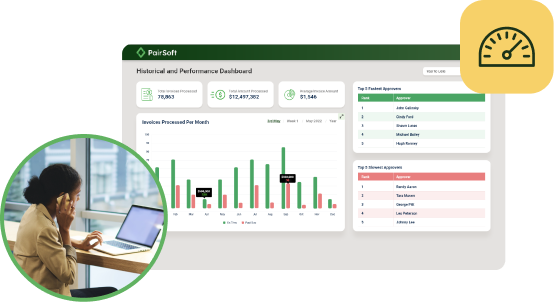For nonprofits, accurate customer relationship management (CRM) data is at the center of effective fundraising, donor engagement, and conducting internal assessments such as a nonprofit SWOT analysis. However, with a vast amount of information flowing in and out of your system, ensuring that each data point is correct can be a challenge.
In this guide, we’ll explore four strategies for achieving and maintaining data accuracy. From establishing robust data management processes to implementing quality control measures, these insights will help you achieve your organization’s data-driven goals.
Conduct Data Audits
A comprehensive data audit involves thoroughly examining your CRM to ensure it’s effective and aligned with your nonprofit’s larger goals. Key stakeholders who regularly use the CRM should be involved in this process, as they are more likely to champion changes and allocate resources to address data issues.
As you assess the system with your team, make sure to account for the following items:
- Data quality: Evaluate the quality, accuracy, and completeness of the data stored in your CRM system. Use the insights to guide your data hygiene and management efforts.
- User training: Assess how well staff and volunteers are trained in using the CRM system effectively. Determine if there are any adoption issues or resistance to using technology.
- Workflow: Track how data is collected, entered, and updated within the CRM. Identify any bottlenecks or manual tasks that can be automated to save time and resources.
- Configuration: Focus on the technical aspects of the CRM system, including its setup, custom features, and integration with other tools in your technology stack. If you use a software provider like Blackbaud, you might take this opportunity to explore their partner network and invest in solutions that improve data accuracy.
If conducting a data audit seems like an overwhelming task for your already busy team, consider working with a technology consultant. They can provide an objective evaluation of your system, recommend improvements, and assist with the implementation of any new features.
Implement Data Entry Protocols
Adhering to data entry protocols will save your team time that would otherwise be spent correcting mistakes, conducting data cleanup, or resolving discrepancies. This efficiency not only improves the quality of your CRM but also allows your staff to focus on more strategic tasks and mission-critical activities.
As you begin the data collection process, implement these data entry protocols to prevent mistakes from happening in the first place:
- Set user controls. Define who can access and modify data. Prioritizing staff with the most CRM-related experience will mitigate risks associated with unauthorized data sharing, including security breaches, data loss, and compliance violations.
- Standardize data formatting. Create rules for how to enter certain data, such as names, addresses, phone numbers, and email addresses. For example, when entering donor phone numbers into your system, you may choose between (123) 456 -7890 or 123-456-7890. While these details may seem trivial, standardizing them will ultimately make it easier to find and organize information in your database.
Compile these guidelines into a manual and share it with your team to ensure everyone is on the same page about your preferred data entry practices.
Regularly Update and Cleanse Data
Despite implementing strict data-entry guidelines, there is still a possibility of accumulating dirty data over time. For instance, data can become outdated as customer information changes or incomplete as certain fields may be left blank or not fully populated.
Set up a regular schedule to address any data hygiene issues that may arise, including:
- Duplicates: Let’s consider a scenario in which multiple donation entries exist for an individual within your CRM, even though they’re a first-time donor. This can cause you to overestimate your fundraising revenue, leading to financial discrepancies and a misallocation of funds. To avoid inaccurate reporting, merge or delete duplicate entries.
- Errors: If a donor updates their information, whether it be their phone number, mailing address, or recurring giving amount, ensure it’s reflected in the CRM.
- Missing information: Nonprofits that are missing information about their supporters should consider investing in data appending services. Using a third-party data provider to source new information for your CRM can help you enhance your donor profiles and achieve your fundraising goals.
Many modern CRM systems, like Blackbaud Raiser’s Edge NXT, include built-in data validation tools that automatically verify and validate data entered into your database. However, it’s still important to conduct manual data updates to guarantee that everything is accurate and up-to-date.
Train and Educate Staff
Ensure that your team understands the power of clean data and is well-equipped with data hygiene best practices by providing comprehensive training. This can involve:
- Onboarding: When introducing staff members to your CRM, ensure they receive thorough onboarding that covers the basics of data entry and data management. Offer hands-on training sessions and resources, such as user manuals or video tutorials, to guide them through the learning process.
- Training: Recognize that CRM training is an ongoing process. Host regular team meetings to provide information on system updates, discuss data hygiene trends, and troubleshoot any issues.
- Recognition: Encourage staff to take ownership of the data they enter and review their own records for accuracy. Recognize individuals for their achievements to foster a stronger commitment to data management.
For the best results, tailor training to different roles within your organization. Fundraising staff, in particular, should focus their attention on building donor profiles, tracking donations, and reporting on campaigns. On the other hand, program managers should be given guidance on outcome tracking, grant management, and volunteer coordination functionalities.
From donor management to program evaluation, fundraising campaigns to volunteer coordination, your nonprofit’s ability to fulfill its mission relies on the trustworthiness of your data. Put these tips into action and ensure that they’re part of an ongoing data hygiene process. Doing so will help you make data-driven decisions that propel your organization towards success.






